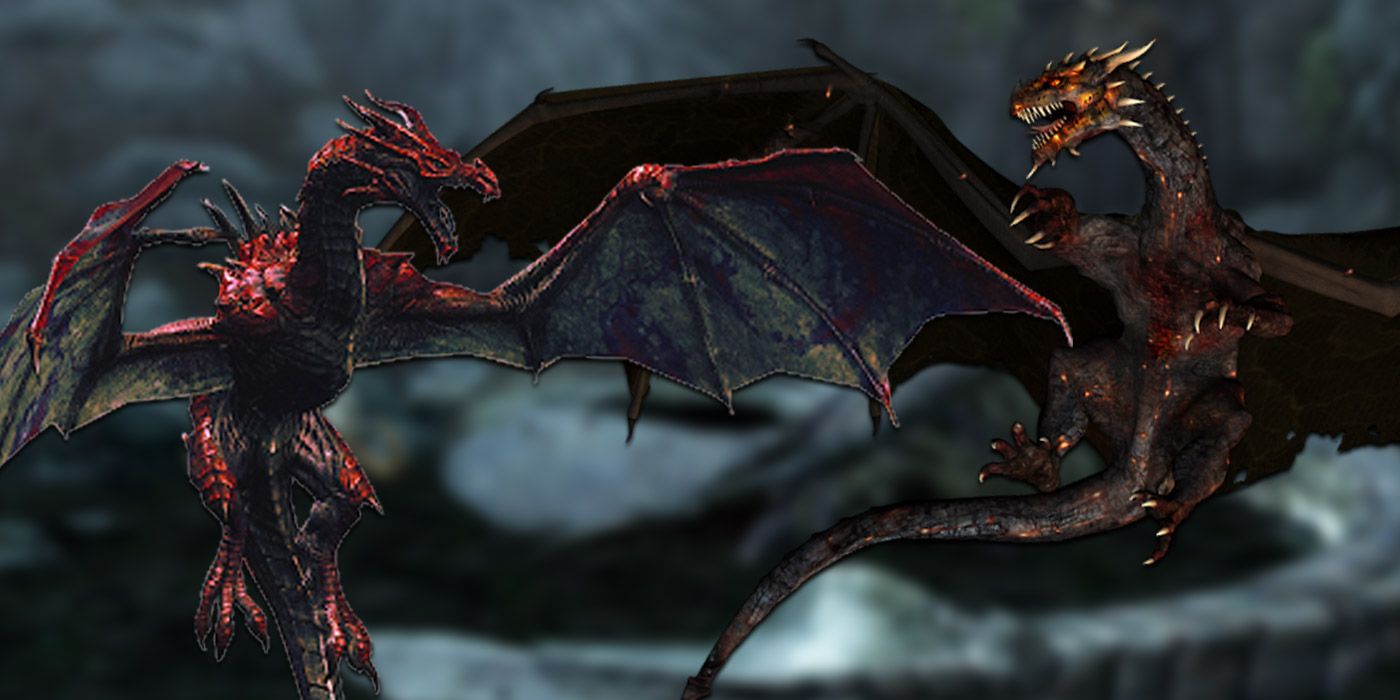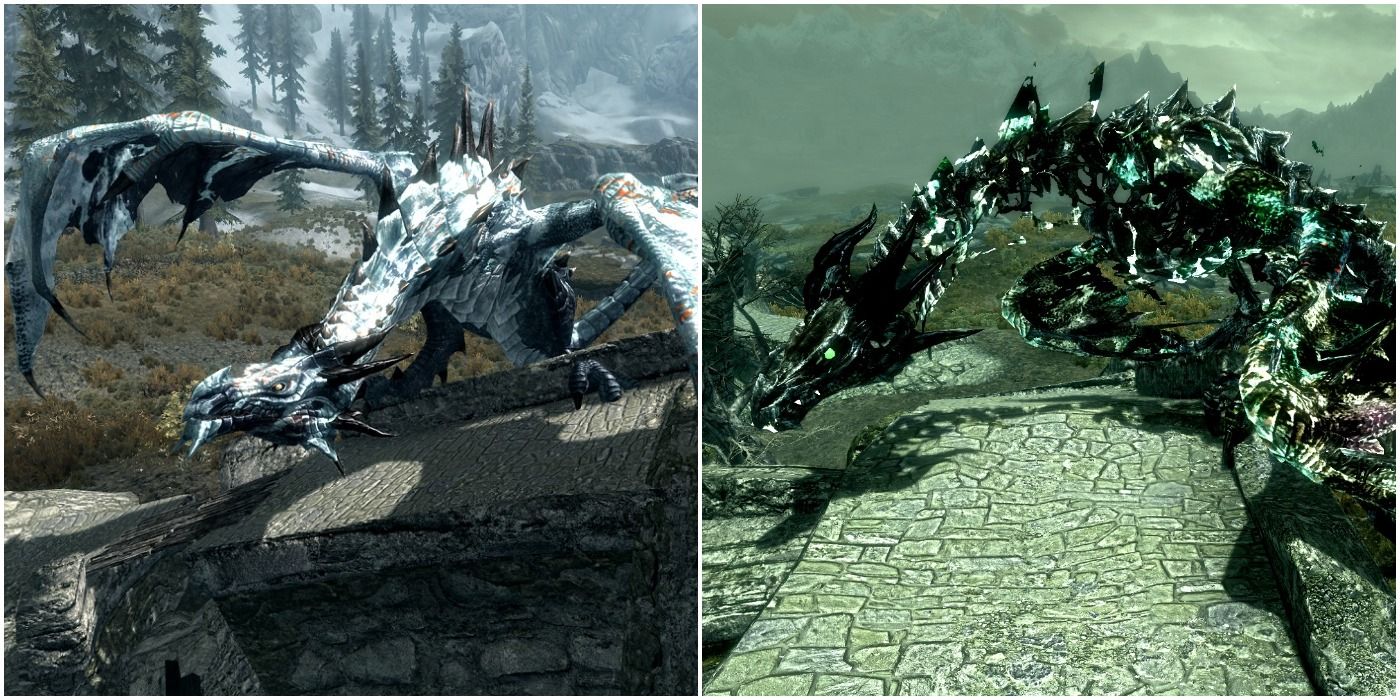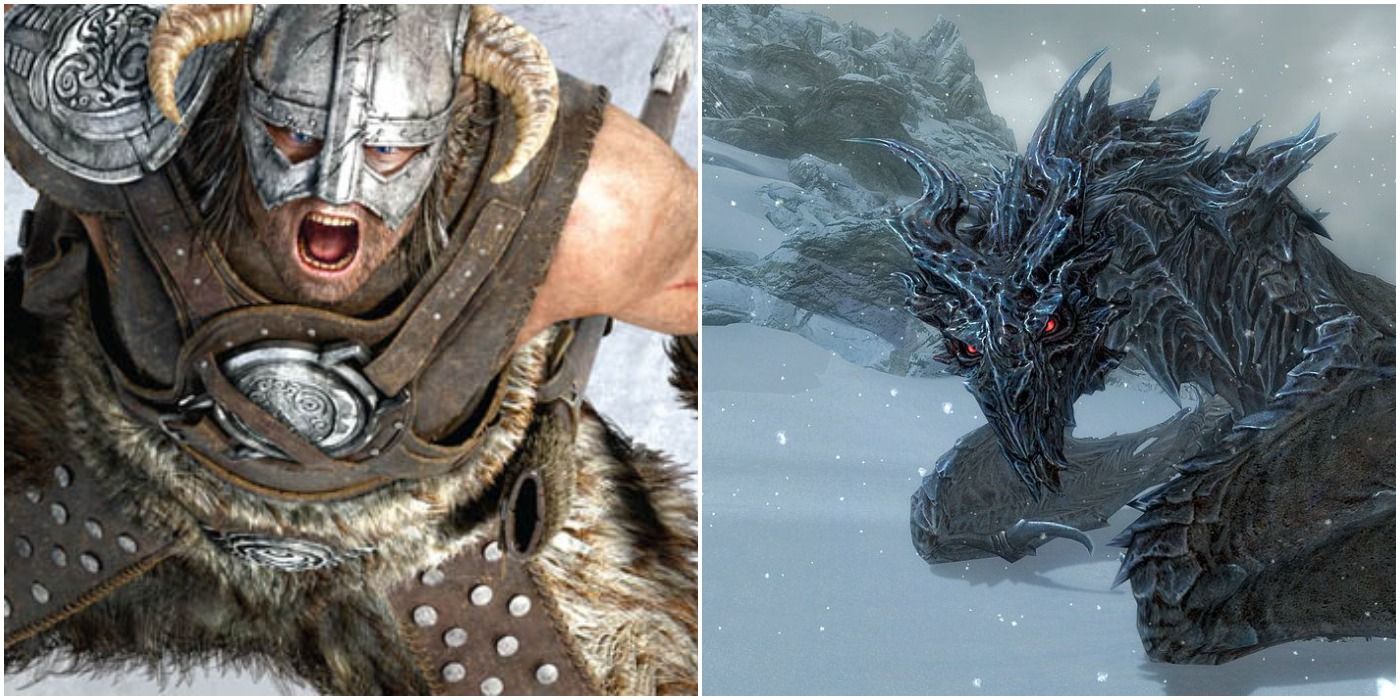"Fus Ro Dah!" is an iconic cry from Skyrim, Bethesda's landmark fantasy RPG. The shout can knock enemies and items backward, stagger opponents, and even instantly kill weaker enemies in later DLCs. Literally translated, the shout reads as "Force, Balance, Push!" Of course, this is generally phrased much more elegantly as "Unrelenting Force" in the game. Players learn this shout after defeating a powerful Draugr, by examining the huge words scrawled onto the dungeon's wall and absorbing their magic. These words are magical because they come from Skyrim's Dragon Language. This draconic tongue is laced with inherent magic that makes these phrases so powerful. In Skyrim, when a dragon roars, the world splits and tears as they speak.
However, Skyrim's dragon language is not only used by dragons. The "word walls" containing the draconic phrases of power are often around gravesites. Throughout Skyrim, notable figures have their graves marked by script in the dragon language. So, not only is this language full of potent magic, but it's also very important for various significant figures in the world. While dragons make appearances in other Elder Scrolls games, their presence is most obviously felt throughout Skyrim. Even when compared to the huge civil war between the Stormcloaks and Imperials, the imposing shadow of the dragons roaming Tamriel's skies.
Translating Skyrim's dragon language is no mean feat. The chief resources used here will be Dragon Language: Myth No More and also Thuum.org. Dragon Language: Myth No More is one of the hundreds of in-game Skyrim books, written by Tamriel linguist and researcher Hela Thrice-Versed. As a reference text, this provides a great context for how the draconic script works in the canon of Skyrim. Alongside this great canon element, the book also contains a load of brilliant example sentences to draw from. The second resource, Thuum.org, is an admirable product of polyglot Elder Scrolls fans. These fans have created a comprehensive dragon language learning tool, which gives tips on language tropes, spelling, and grammar that is hard to find elsewhere.
The Letters of Skyrim's Dragon Language
Any Skyrim player will be familiar with the titanic word walls scattered around one of Bethesda's best open-world games. These are adorned with the dragon runes that make up the language's alphabet. There are 34 runes in the dragon language. Obviously, there are more letters here than in the English alphabet, and a lot of these extra letters correspond to certain phonetic sounds. For example, the double "i" sound in "Dovahkiin" (or "Dragonborn") is its own letter.
That means if a Skyrim fan was to translate their own name into Draconic runes, they would need to see what sounds their name makes, not just the letters. In addition, not every letter or sound in English actually exists in Dovahzul (or "Dragon-voice" as some fans call the language). This means that if someone is writing proper English nouns in Dragon runes, or trying to speak those nouns, they might need to "transliterate," or slightly altering letters or sounds to make a word fit into a new dialect. This will be especially relevant for people with "C" in their names, as Dovahzul has no equivalent. Instead, dragon linguists should use S, K, or "tsch" sounds to replicate the letter.
Serpentine Sentence Structure in Skyrim
Thankfully, much like the English language, dragon language reads left to right. So, the compound word "dragonborn" is translated as "Dovah-kiin" with "Dovah" meaning "dragon" and "kiin" meaning "born." This both makes it much easier for players to translate, and easier on the game's designers. The languages of No Man's Sky, a game with an undeniable focus on dialects, works in a similar way. When players learn new words from the different species, these words slot into regular dialogue, letting players guess exactly what is being said. Learning the dragon language from Skyrim could allow players to piece together bits of the language in-game.
While the dragon language does follow a similar sentence structure to English, it makes a few changes. These alterations generally serve to make the dragons' speech easier from a writing perspective. Generally, dragon words are not limited to the categories of verbs, adjectives, or nouns. For example, "tinvaak" means "to speak" and the noun "speech." Obviously, it's much easier to put together a language when words can be used interchangeably.
Unsurprisingly, the dragons in Skyrim do not talk exactly like regular people, especially when it comes to questions. When a dragon asks someone a question, they listen. Often, these questions are weightier because they are formed by flipping the subject and the verb in the sentence. For example: "When did you become king?" would be rephrased as "When became you king?" It reflects interestingly on what words have value in Skyrim's dragon language. These words are incredibly powerful, so verbs, words of action, are often given prominence.
Practical Uses of Skyrim's Dragon Language
Once an Elder Scrolls fan masters elements of the Dovahzul, they might be interested in practicing it. Of course, the dragon language has specific uses. In fact, this is where Dragon Language: Myth No More becomes useful. In the text, Hela Thrice-Versed gives a treatise on where these word walls of dragon runes are found, and what they commonly talk about. According to Hela's text, these words primarily appear to mark notable gravesites and events. After translating many of these into Tamrielic, Hela found that these looming word walls often marked the deaths of noble warriors or notorious brigands.
However, as a chronicle of the history of Skyrim, these word walls did not only document battle deaths. One of the passages translated to "This stone commemorates the doomed elf children of the Autumn Field, who fled in Terror from the sharp swords of the ancient enemy." So, when normal people use the dragon language, it is to remark upon important, almost landmark events in history.
Skyrim is available on PC, PS3, PS4, Switch, Xbox 360, and Xbox One.
Source: Thumm.org




